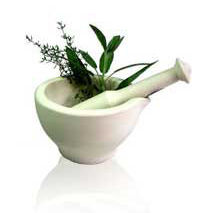
Definition
Homeopathy, or homeopathic medicine, is a holistic system of treatment that originated in the late eighteenth century. The name homeopathy is derived from two Greek words that mean "like disease." The system is based on the idea that substances that produce symptoms of sickness in healthy people will have a curative effect when given in very dilute quantities to sick people who exhibit those same symptoms. Homeopathic remedies are believed to stimulate the body's own healing processes. Homeopaths use the term "allopathy," or "different than disease," to describe the use of drugs used in conventional medicine to oppose or counteract the symptom being treated.
Purpose
Homeopathic physicians seek to cure their patients on the physical, mental and emotional levels, and each treatment is tailored to a patient's individual needs. Homeopathy is generally a safe treatment, as it uses medicines in extremely diluted quantities, and there are usually minimal side effects. Its non-toxicity makes it a good choice for the treatment of children. Another benefit of homeopathy is the cost of treatments; homeopathic remedies are inexpensive, often a fraction of the cost of conventional drugs.
Homeopathic treatment has been shown effective in treating many conditions. Colds and flu may be effectively treated with aconite and bryonia. Influenza suffers in a double-blind study found that they were twice as likely to recover in 48 hours when they took homeopathic remedies. Studies have been published in British medical journals confirming the efficacy of homeopathic treatment for rheumatoid arthritis. Homeopathic remedies are effective in treating infections, circulatory problems, respiratory problems, heart disease, depression and nervous disorders, migraine headaches, allergies, arthritis, and diabetes. Homeopathy is a good treatment to explore for acute and chronic illnesses, particularly if these are found in the early stages and where there is not severe damage. Homeopathy can be used to assist the healing process after surgery or chemotherapy.
Description
Origins
Homeopathy was founded by German physician Samuel Hahnemann (1755–1843), who was much disturbed by the medical system of his time, believing that its cures were crude and some of its strong drugs and treatments did more harm than good to patients. Hahnemann performed experiments on himself using Peruvian bark, which contains quinine, a malaria remedy. He concluded that in a healthy person, quinine creates the same symptoms as malaria, including fevers and chills, which is the reason why it is effective as a remedy. He then began to analyze the remedies available in nature by what he called provings. Provings of homeopathic remedies are still compiled by dosing healthy adults with various substances and documenting the results, in terms of the dose needed to produce the symptoms and the length of the dose's effectiveness. The provings are collected in large homeopathic references called materia medica or materials of medicine.
Hahnemann formulated these principles of homeopathy:
• Law of Similars (like cures like)
• Law of the Infinitesimal Dose (The more diluted a remedy is, the more potent it is.)
• illness is specific to the individual
Hahnemann's Law of Similars was based on thinking that dated back to Hippocrates in the fourth century B.C. It is the same thinking that provided the basis for vaccinations created by Edward Jenner and Louis Pasteur. These vaccines provoke a reaction in the individual that protects against the actual disease. Allergy treatments work the same way. By exposing a person to minute quantities of the allergen, the person's tolerance levels are elevated.
The Law of the Infinitesimal Dose has always caused controversy among those outside the field of homeopathy. Hahnemann contended that as he diluted his remedies with water and alcohol and succussed, or shook, them, the remedies actually worked more effectively. In fact, diluted homeopathic remedies may have no chemical trace of the original substance. Practitioners believe that the electromagnetic energy of the original substance is retained in the dilution, but toxic side effects of the remedy are not. It is this electrochemical "message" that stimulates the body to heal itself.
Homeopathic practitioners believe that illness is specific to an individual. In other words, two people with severe headaches may not receive the same remedies. The practitioner will ask the patient questions about lifestyle, dietary habits, and personality traits, as well as specific questions about the nature of the headache and when it occurs. This information gathering is called profiling or case-taking.
In the early 1900s, homeopathy was popular in America, with over 15 percent of all doctors being homeopathic. There were 22 major homeopathic medical schools, including Boston University and the University of Michigan. However, with the formation of the American Medical Association, which restricted and closed down alternative practices, homeopathy declined for half a century. When the 1960s invigorated back-to-nature trends and distrust of artificial drugs and treatments, homeopathy began to grow again dramatically through the next decades. In 1993, The New England Journal of Medicine reported that 2.5 million Americans used homeopathic remedies and 800,000 patients visited homeopaths in 1990, and it has continued to grow. Homeopathy is much more popular in Europe than in the United States. French pharmacies are required to make homeopathic remedies available along with conventional medications. Homeopathic hospitals and clinics are part of the national health system in Britain. It is also practiced in India and Israel, among other countries.
